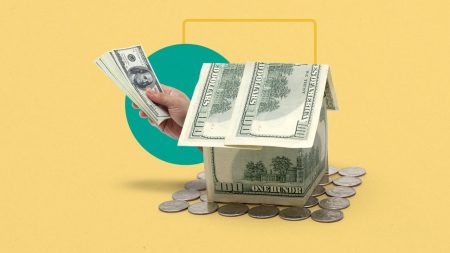Feverpitched/ Getty Images; Illustration by Austin Courregé/Bankrate
Key takeaways
- Lenders often sell mortgages to other companies or investors to free up funds for them to offer more loans.
- As a homeowner, you can’t prevent your mortgage from being sold, but you do have the right to receive information about the transfer.
- Trading mortgage-backed securities in the secondary mortgage market enables a continuous flow of funds in the housing and financing markets.
Before you applied for a mortgage, you watched interest rates, compared multiple lending options and scrutinized the terms to make sure you landed the best deal. After all that research and carefully choosing a lender, you might be asking : Why did my mortgage get sold?
While it may feel surprising, there is no need to worry. Mortgages are bought and sold all the time. Here’s why, and what you can do about it.
Why do mortgages get sold?
Many lenders specialize in originating mortgages, but often the initial lender can’t afford to wait 15 or 30 years for you to pay it all back. By selling the loan, the lender no longer has to keep your debt on the books and can offer loans to other prospective homeowners. The lender that originated the loan makes money through various fees charged at closing, then selling the loan enables them to turn around and do it again.
Behind the scenes, your loan could be packaged with other loans and sold as part of a mortgage-backed security (MBS). This trading of MBS makes up what’s known as the secondary mortgage market.
The workings of the secondary mortgage market may seem complex, but the goal is simple: to ensure that funds continue flowing through the housing and financing markets. MBS investors get income (from the mortgage payments of the MBS loan portfolio), and mortgage lenders get cash — with which they can extend loans to new borrowers.
What happens when your mortgage is sold?
When a mortgage is sold, a new company is typically buying the servicing rights. Those rights include collecting and processing the payments, along with all the other regular duties that come with mortgages. Those duties may include making disbursements from an escrow account to taxing authorities and property insurers. Some entities specialize in taking care of those servicing obligations.
Before your mortgage is sold, you’ll receive notice about the new servicer. Federal law requires that you receive a notice of the change at least 15 days before the switch. Then, within 30 days, the new mortgage owner must send you its name, address and contact number.
What to do if your mortgage is sold
If you receive a notice that your mortgage has been sold, the first step is simple: Don’t panic. The terms of the loan — your interest rate, monthly payment and remaining balance — will not change. In fact, the only significant changes will be where you make your payment and who you’ll call if you need assistance.
But it’s still important to keep an eye on your information during this transition. While selling mortgages is fairly common, mistakes and errors can happen. Make sure to:
- Read the notice carefully: Some lenders retain servicing rights even after selling a mortgage, so look for any mention of the mortgage servicer changing. If it is changing, confirm that all of your contact info is up to date so you don’t miss any important communication.
- Update your payment process: You may need to redirect your ACH withdrawal — if you do auto-payments — to a different entity or mail a check to a new address.
- Double-check the effective dates: Know when the old payments should stop and the new ones should start. If you recently sent a payment to the previous mortgage owner, no worries: There is a 60-day grace period after servicing rights have been sold.
- Keep receipts: Keep copies of statements from the months surrounding the sale and transfer to a new owner. By retaining documentation, you can prove that you submitted payments on time in the event of any confusion.
- Look for confirmation: Watch carefully for confirmation that the first new payment went through.
- Reach out if anything is unclear: Don’t be afraid to contact the new servicer with questions. Their contact information should be provided on the notice.
How to find out who owns your mortgage
If you’re not sure who currently owns your mortgage, there are several ways to find out:
- Check your mortgage statement: Start by checking your monthly statement — these usually include information about your loan servicer (the company that collects your payments). This document provides details about the current owner of your mortgage.
- Review closing documents: Look through the papers from closing, including the promissory note and deed of trust. These documents may include information about the original lender and any subsequent transfers of ownership.
- Contact your loan servicer: Reach out to your loan servicer directly by phone, mail or through its website. It is legally obligated to tell you who owns your mortgage or if it has been sold to another entity.
- Use an online mortgage lookup tool: Fannie Mae and Freddie Mac, the government-sponsored enterprises that buy most mortgages, offer online tools that let you search for your mortgage by entering your loan number or property address. These tools also provide information about your loan servicer and the current owner of your mortgage.
- Check with MERS: If your mortgage has been securitized, you can check the Mortgage Electronic Registration Systems (MERS) website. MERS tracks loan servicing and ownership changes for many mortgages in the United States.
Frequently asked questions
Why we ask for feedback
Your feedback helps us improve our content and services. It takes less than a minute to
complete.
Your responses are anonymous and will only be used for improving our website.
Help us improve our content
Read the full article here












